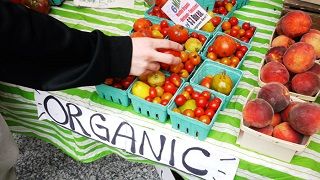From Guest Blogger Paula Sheamus: Grow Your Own Vegetables–Organic Gardening

That is why many Westerners believe that growing your own vegetables will increase longevity and prevent various types of cancers and liver diseases. In this article we are going to talk about some of the benefits about having your own vegetable garden, and how best to increase productivity without having to resort using artificial growth stimulants or any hazardous pesticides. Let’s take a look.
Now assuming that you have at least some agricultural background, we are not going to get into the actual process of planting and growing vegetables, but rather we are going to disgust some useful tips regarding using organic compounds to boost your harvest output, and the environmental implications associated with cutting down on your power and water consumption.
Substituting non-organic with organic mulches
The reason people go for organic mulches is because they do a better job of feeding your plants with nutrients as they decompose. Inorganic mulches, such as gravel, stones, black plastic, and geotextiles don’t have that ability, although they are some instances where their non-organic properties might come in hand.
You can make your own organic mulch by combining two or more nutrient-rich organic compounds. Those might include, but are not limited to: compost/work casting, straw, leaves, grass, wood chips, bark etc.
When using organic mulches, be sure that your vegetable garden is completely weeded before proceeding with the application of your mulch. Lay at least 2 inches of mulch around your vegetables and watch out for any weeds that might have previously escaped your attention. As time goes by and your organic mulch decomposes due to exposure to the elements, your vegetable will get progressively stronger, and thus you will have much better harvest.
Cutting down on your water and electricity
Remember that we have only one planet on which to thrive and grow our sweet, delicious veggies. Abusing power and water can not only get expensive over time, but it is also quite inefficient. In recent years there have been many breakthroughs regarding proper irrigation techniques and power saving modulation.
Electricity is best preserved by using alternative sources of energy, rather than the grid. One solar panel for example will be enough to power your whole irrigation system as well as any lights you might be using.
If you are still using the old water-can nonsense, it is time to wake up and step into the 21st century. There are literally hundreds of different irrigation systems; each fitted for its specialized purpose. Vegetable gardens are very demanding when it comes to water, so choosing the best irrigation system is crucial for quality crops. Avoid using furrows, basins and hoses to water your vegetables. As effective as they might be, you are wasting an unspeakable amounts of water; where as a sprinkler system will use up to 3 times less water, if not more. You can set the time and amount of water your vegetables will need, so not a drop of water goes to waste. Consult a professional before you start setting up your sprinkler system. They will explain to you the Do’s and Don’ts when using a sprinkler, and the maintenance it would require to keep it up and running. You do however have to keep a close eye on the water supply, for there have been instances of breakage, and that means no water will be going to your plants.
Author Bio: Paula Sheamus is passionate blogger and writer. She loves eco way of living and sw8 tenancy cleaning. She spends her spare time blogging for her lovely audience.
